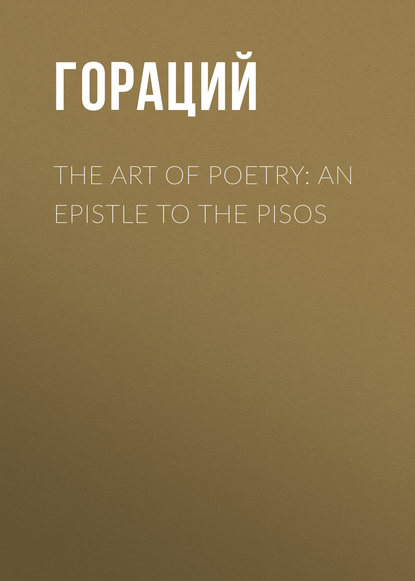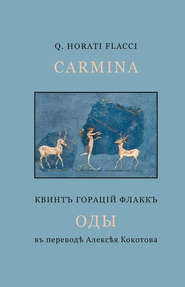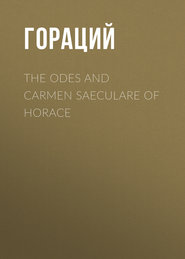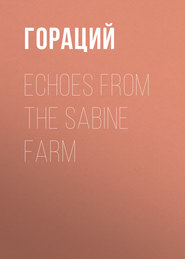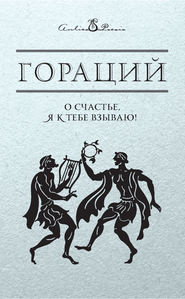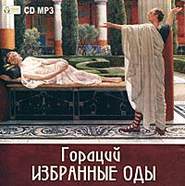По всем вопросам обращайтесь на: info@litportal.ru
(©) 2003-2024.
✖
The Art of Poetry: an Epistle to the Pisos
Настройки чтения
Размер шрифта
Высота строк
Поля
Nor we, nor all we do, can death withstand;
Whether the Sea, imprison'd in the land,
A work imperial! takes a harbour's form,
Where navies ride secure, and mock the storm;
Whether the Marsh, within whose horrid shore
Barrenness dwelt, and boatmen plied the oar,
Now furrow'd by the plough, a laughing plain,
Feeds all the cities round with fertile grain;
Or if the River, by a prudent force,
The corn once flooding, learns a better course.
Nedum sermonum stet honos, et gratia vivax.
Multa renascentur, quae jam cecidêre; cadentque
Quae nunc sunt in honore vocabula, si volet usus,
Quem penés arbitrium est, et jus, et norma loquendi.
Res gestae regumque ducumque et tristia bella,
Quo scribi possent numero, monstravit Homerus.
Versibus impariter junctis querimonia primúm,
Pòst etiam inclusa est voti sententia compos.
Quis tamen exiguos elegos emiserit auctor,
Grammatici certant, et adhuc sub judice lis est.
Archilochum proprio rabies armavit iambo.
Hunc socci cepêre pedem, grandesque cothurni,
Alternis aptum sermonibus, et populares
Vincentem strepitus, et natum rebus agendis.
The works of mortal man shall all decay;
And words are grac'd and honour'd but a day:
Many shall rise again, that now are dead;
Many shall fall, that now hold high the head:
Custom alone their rank and date can teach,
Custom, the sov'reign, law, and rule of speech.
For deeds of kings and chiefs, and battles fought,
What numbers are most fitting, Homer taught:
Couplets unequal were at first confin'd
To speak in broken verse the mourner's mind.
Prosperity at length, and free content,
In the same numbers gave their raptures vent;
But who first fram'd the Elegy's small song,
Grammarians squabble, and will squabble long.
Archilochus, 'gainst vice, a noble rage
Arm'd with his own Iambicks to engage:
With these the humble Sock, and Buskin proud
Shap'd dialogue; and still'd the noisy croud;
Musa dedit fidibus divos, puerosque deorum,
Et pugilem victorem, et equum certamine primum,
Et juvenum curas, et libera vina referre.
Descriptas servare vices, operumque colores,
Cur ego, si nequeo ignoroque, poëta salutor?
Cur nescire, pudens pravè, quàm discere malo?
Versibus exponi tragicis res comica non vult;
Indignatur item privatis ac prope socco
Dignis carminibus narrari coena Thyestae.
Singula quaeque locum teneant sortita decenter.
Embrac'd the measure, prov'd its ease and force,
And found it apt for business or discourse.
Gods, and the sons of Gods, in Odes to sing,
The Muse attunes her Lyre, and strikes the string;
Victorious Boxers, Racers, mark the line,
The cares of youthful love, and joys of wine.
The various outline of each work to fill,
If nature gives no power, and art no skill;
If, marking nicer shades, I miss my aim,
Why am I greeted with a Poet's name?
Or if, thro' ignorance, I can't discern,
Why, from false modesty, forbear to learn!
A comick incident loaths tragick strains:
Thy feast, Thyestes, lowly verse disdains;
Familiar diction scorns, as base and mean,
Touching too nearly on the comick scene.
Each stile allotted to its proper place,
Let each appear with its peculiar grace!
Interdum tamen et vocem comoedia tollit;
Iratusque Chremes tumido delitigat ore;
Et tragicus plerumque dolet sermone pedestri.
Telephus aut Peleus, cum pauper et exul uterque,
Projicit ampullas et sesquipedalia verba,
Si curat cor spectantis tetigisse querelâ.
Non satis est pulchra esse poëmata; dulcia sunto,
Et quocunque volent, animum auditoris agunto.
Ut ridentibus arrident, ita flentibus adflent
Humani vultus; si vis me flere, dolendum est
Primum ipsi tibi: tunc tua me infortunia laedent.
Telephe, vel Peleu, male si mandata loqueris,
Aut dormitabo, aut ridebo: tristia moestum
Vultum verba decent; iratum, plena minarum;
Yet Comedy at times exalts her strain,
And angry Chremes storms in swelling vein:
The tragick hero, plung'd in deep distress,
Sinks with his fate, and makes his language less.
Whether the Sea, imprison'd in the land,
A work imperial! takes a harbour's form,
Where navies ride secure, and mock the storm;
Whether the Marsh, within whose horrid shore
Barrenness dwelt, and boatmen plied the oar,
Now furrow'd by the plough, a laughing plain,
Feeds all the cities round with fertile grain;
Or if the River, by a prudent force,
The corn once flooding, learns a better course.
Nedum sermonum stet honos, et gratia vivax.
Multa renascentur, quae jam cecidêre; cadentque
Quae nunc sunt in honore vocabula, si volet usus,
Quem penés arbitrium est, et jus, et norma loquendi.
Res gestae regumque ducumque et tristia bella,
Quo scribi possent numero, monstravit Homerus.
Versibus impariter junctis querimonia primúm,
Pòst etiam inclusa est voti sententia compos.
Quis tamen exiguos elegos emiserit auctor,
Grammatici certant, et adhuc sub judice lis est.
Archilochum proprio rabies armavit iambo.
Hunc socci cepêre pedem, grandesque cothurni,
Alternis aptum sermonibus, et populares
Vincentem strepitus, et natum rebus agendis.
The works of mortal man shall all decay;
And words are grac'd and honour'd but a day:
Many shall rise again, that now are dead;
Many shall fall, that now hold high the head:
Custom alone their rank and date can teach,
Custom, the sov'reign, law, and rule of speech.
For deeds of kings and chiefs, and battles fought,
What numbers are most fitting, Homer taught:
Couplets unequal were at first confin'd
To speak in broken verse the mourner's mind.
Prosperity at length, and free content,
In the same numbers gave their raptures vent;
But who first fram'd the Elegy's small song,
Grammarians squabble, and will squabble long.
Archilochus, 'gainst vice, a noble rage
Arm'd with his own Iambicks to engage:
With these the humble Sock, and Buskin proud
Shap'd dialogue; and still'd the noisy croud;
Musa dedit fidibus divos, puerosque deorum,
Et pugilem victorem, et equum certamine primum,
Et juvenum curas, et libera vina referre.
Descriptas servare vices, operumque colores,
Cur ego, si nequeo ignoroque, poëta salutor?
Cur nescire, pudens pravè, quàm discere malo?
Versibus exponi tragicis res comica non vult;
Indignatur item privatis ac prope socco
Dignis carminibus narrari coena Thyestae.
Singula quaeque locum teneant sortita decenter.
Embrac'd the measure, prov'd its ease and force,
And found it apt for business or discourse.
Gods, and the sons of Gods, in Odes to sing,
The Muse attunes her Lyre, and strikes the string;
Victorious Boxers, Racers, mark the line,
The cares of youthful love, and joys of wine.
The various outline of each work to fill,
If nature gives no power, and art no skill;
If, marking nicer shades, I miss my aim,
Why am I greeted with a Poet's name?
Or if, thro' ignorance, I can't discern,
Why, from false modesty, forbear to learn!
A comick incident loaths tragick strains:
Thy feast, Thyestes, lowly verse disdains;
Familiar diction scorns, as base and mean,
Touching too nearly on the comick scene.
Each stile allotted to its proper place,
Let each appear with its peculiar grace!
Interdum tamen et vocem comoedia tollit;
Iratusque Chremes tumido delitigat ore;
Et tragicus plerumque dolet sermone pedestri.
Telephus aut Peleus, cum pauper et exul uterque,
Projicit ampullas et sesquipedalia verba,
Si curat cor spectantis tetigisse querelâ.
Non satis est pulchra esse poëmata; dulcia sunto,
Et quocunque volent, animum auditoris agunto.
Ut ridentibus arrident, ita flentibus adflent
Humani vultus; si vis me flere, dolendum est
Primum ipsi tibi: tunc tua me infortunia laedent.
Telephe, vel Peleu, male si mandata loqueris,
Aut dormitabo, aut ridebo: tristia moestum
Vultum verba decent; iratum, plena minarum;
Yet Comedy at times exalts her strain,
And angry Chremes storms in swelling vein:
The tragick hero, plung'd in deep distress,
Sinks with his fate, and makes his language less.
Другие электронные книги автора Квинт Гораций Флакк
Другие аудиокниги автора Квинт Гораций Флакк
Избранные оды




 4.67
4.67





